- Home
- Jim Butcher
Princeps Fury ca-5 Page 15
Princeps Fury ca-5 Read online
Page 15
Amara loosed the arrow. It leapt gracefully over the forty yards between her and the grass lion, struck its skull just over the brow, and glanced off the hard bone to bury itself in the powerful, hunched shoulders.
The Vord scout did not so much as twitch.
Amara snatched up another arrow.
Clods of earth flew up from beneath the lion’s feet, propelled by the raw power of its legs. Amara tried not to think of what would happen if a battering ram of four hundred pounds of rotting meat and hard bone slammed into her at the rate the beast was moving. She set another arrow to string as the lion’s passage startled a covey of birds from the grass, sending them up in a slow-motion panic of feathers and beating wings and glassy eyes.
She dropped to one knee, drew the arrow to full extension, and held it, waiting, timing each plunge of the taken lion’s ruined body, tracking its motion, waiting for the timing to be perfect.
Twenty yards. Fifteen. Ten.
When it was ten feet away, she loosed her arrow and flung herself flat to one side.
The shaft stabbed out and vanished into the lion’s open mouth, its broad point plunging into the back of its throat.
The lion’s front limbs suddenly went loose, and its jaws and muzzle snapped down, smashing violently into the earth, plowing a shallow furrow as its momentum carried it forward. Its spine and hindquarters twisted and flipped up and over, then came smashing down onto the earth as well, forcing Amara to jerk her knees up to her chest, lest her legs be crushed underneath the beast’s descending weight.
The impact ruptured the grass lion’s innards, and an explosion of noxious fumes washed over her. Her stomach twisted in revulsion, and she scrambled away as it began to empty itself.
She looked back at the lion several unpleasant seconds later, to see it still twitching, and realized that she could hear… something, making a tinny, wheezing sound of pain. The Vord taker. When one of them inhabited a body, it was usually somewhere inside the skull. The arrow must have wounded the thing.
The job wasn’t done. The grass lion had never been the danger-the taker was. It could not be allowed to return to the rest of the Vord.
She looked around until she spotted a stone a little smaller than her head. She took it up, steeled herself against the stench, and walked back over to the still twitching corpse of the grass lion. She lifted the stone and, with all her strength, brought it smashing down on the grass lion’s skull.
The wheezing scream of pain stopped.
She looked up to see Bernard plunge from the trees and draw his horse to an abrupt halt, bow in hand. He stared at her for a moment. Then he simply slid his bow back into the holder on his saddle and nudged his horse into a walk again. Her own mount had followed his horse once she had left it, and came following along.
She walked over to meet him and get out of the stench.
He passed her a flask of water. She rinsed and spat the bad taste out of her mouth, then drank deeply.
He studied the grass lion gravely. “Nice shooting.”
From him, it was no idle comment. “Thank you,” she said.
He clucked to her horse, who docilely came over to his outreached hand. He collected the reins and offered them to Amara. “We’d better get moving. Where there’s one scout, there will be more.”
“Bernard,” she said, staring at the corpse. “I don’t want to end up like that. I don’t want them to use me against my own people. I’d rather die.” She turned her face to him. “If it comes to that, I want you to make sure of it.”
“It won’t,” Bernard said.
“But if it does-”
His eyes hardened. “It won’t,” he said, with harsh finality, and all but threw the reins at her chest. “No compromises, Countess. Not for anyone. Including the Vord.”
CHAPTER 14
“The art of diplomacy is the art of compromise,” Lady Placida said calmly, as the wind coach began its descent to the Shieldwall. “The key here is finding the compromise that will satisfy everyone involved.”
“That presumes that everyone involved is willing to compromise,” Isana replied. “The Icemen have been at war with Alera for centuries. And I can’t imagine that the lords of Antillus or Phrygia will be particularly inclined to be gracious, after generations of combat with the northern tribes.”
Aria sighed. “I wasn’t presuming. I’d hoped you hadn’t realized it. I thought perhaps that a positive attitude on your behalf might put everyone sufficiently off-balance enough to allow you to get something accomplished.”
Isana smiled faintly. “What can you tell me about Antillus Raucus?”
“He’s a great fighter, probably the most accomplished tactician in Alera, almost unquestionably the most practiced battlecrafter in the Realm. He’s won significant battles against-”
Isana shook her head, frowning as the air grew noticeably colder. She drew her cloak tighter around herself. “Not that,” she said gently. “That isn’t what I need to know. Tell me about him.”
Aria closed her eyes for a moment and shook her head in self-recrimination. “Of course. I’m sorry, I’ve been thinking in military terms for most of the trip. How to make sure I can keep getting food and supplies to my husband and his men, that sort of thing.”
“Understandable,” Isana said gently. “Raucus?”
Aria folded her hands in her lap and frowned out the window for a moment. “Passionate,” she said, finally. “I don’t think I’ve ever known a man more passionate than Raucus. That’s partly what makes his firecrafting so strong, I think. He believes furiously in whatever it is he’s doing. Or only does whatever it is he believes in most furiously. I suppose it depends upon one’s point of view.”
“He’s loyal to the Realm?” Isana asked.
Aria took a slow breath. “He’s… loyal to the concept of loyalty,” she said finally.
“I’m not sure I see the distinction.”
“Raucus believes that every High Lord does, and should, owe fealty to the First Lord,” Aria said. “He can’t stand power-seekers like the Aquitaines, Rhodes, and Kalarus, and he will scrupulously adhere to what he sees as the ideal for how a High Lord should behave-but he detests Gaius. He’d rather gouge out his own eyes than show the least amount of voluntary personal respect for the man currently wearing the Crown, as opposed to the respect due the Crown itself.”
“Why?” Isana asked. “Not that Gaius hasn’t done a number of things to earn enemies in his time-but why Raucus?”
“He and Septimus were close when they were young,” Aria said. “Inseparable, really, after a year or so of initial difficulties. After Septimus died, Raucus stopped attending Wintersend, stopped writing to the Citadel, and refused to answer any letters from the First Lord directly.”
Isana felt her eyes widen. Septimus had not truly died in battle with the Marat, as the Realm at large had been led to believe. He had been killed during the battle as a result of the actions of a group of Citizens, a conspiracy of crafters powerful enough to neutralize Septimus’s furies and leave him vulnerable to the barbarians. In fact, the successful attempt had not been the first but merely the last in a series of half a dozen such incidents. Isana knew that Septimus had believed that he had puzzled out who were the ones behind the conspiracy-and that he had been in the process of gathering evidence when he died.
If Raucus had been close friends with Septimus, it was possible that her late husband had shared what he knew with the then-young lord of Antillus. “Great furies,” Isana breathed. “He knows something.”
Aria arched a red-gold eyebrow. “Knows something? What do you mean?”
Isana shook her head quickly. “Nothing, nothing.” She gave Aria a quick, apologetic smile. “Nothing I can share at the moment.”
Aria opened her mouth in a silent “ah” and nodded. She frowned and gathered her own cloak closer to her body. “Always so cold up at the Wall.”
Isana looked out the window, to see the Shieldwall, an enormous construction
of dark stone, perhaps twenty yards below them. It was early evening, and a circle of lights marked a landing space on the wall. The countryside around, blanketed in snow, glowed with the eerie half-light of winter.
“Tell me this, Aria,” Isana said. “In your judgment-is he a good man?”
Aria blinked at Isana. She hesitated for several seconds, as if wrestling with a concept she had never encountered. “I…” She spread her hands helplessly. “I’m not sure how to answer. There have been days when I haven’t been proud of the things I’ve needed to do for the sake of duty.”
Isana smiled faintly. “I’ve had days like that as well,” she said quietly. “And it doesn’t change anything or make the question invalid. Ask your heart. Is he a good man?”
Lady Placida regarded Isana slowly for a moment, before a rather worn half smile appeared on her mouth, along with a sardonic little chuckle. “For a High Lord. Yes. He’s bullheaded and arrogant, his ego is bloated to the size of a mountain, he’s headstrong, often inconsiderate, more than occasionally rude, intolerant to anyone he doesn’t respect, and short-tempered with anyone who challenges him. And underneath all that-there’s more of the same, only better cured.” She shook her head. “But beneath that, yes. I sent my own sons to Antillus to train under him when they came of age. That is how much I trust Antillus Raucus.”
Isana smiled at her, and said, “Thank you, Aria. That’s encouraging. Perhaps we have a chance to make something work out after all.”
“Perhaps you didn’t listen to most of what I just said,” Aria replied, her tone dry.
The coach settled down with a gentle bump, and the winds died down. A second later, a Legion band began playing the Crown Anthem.
Isana grimaced.
“It is traditional,” Aria murmured.
“Yes, yes.” Isana sighed. “But the tune is ghastly. It sounds like a sick gargant dying. What precisely qualifies it to be the Crown Anthem?”
“Tradition,” Aria replied promptly.
“And tradition alone, apparently,” Isana said. “Though perhaps my taste in music is simply… uneducated.”
“Oh, no, not at all,” Aria said. “I am well versed in several musical traditions, and assure you that the Crown Anthem is perfectly hideous.”
Araris, who had sat silent and motionless through most of the trip-asleep, actually, though he’d dozed with that catlike lightness that could have come instantly to waking, had the need arose, opened his eyes as the Knights who had borne the air coach came to the door and opened it. “Ladies,” he murmured. “If you will excuse me.” He exited the coach first-as he insisted upon doing every time, these days-and a moment later leaned his head back inside and extended his hand to Isana. “Very well, ladies.”
Isana took Araris’s hand and left the coach, emerging into, not the light of furylamps, but instead raw torchlight atop the wall. It was far dimmer and, somehow, more primal than the tiny, clean, blue-white furylamps inside the wind coach. Red light and shadow lay heavily over everything, and she found herself instinctively becoming more wary of her surroundings.
Standing atop the Shieldwall was, Isana realized, more like standing upon a road or bridge than any building-or more accurately, like standing in the square of a small town. The wall was fifty feet wide, and a number of structures existed atop the Wall, within sight of where the cart had landed, framed by four towers that rose up from the Wall, standard Aleran ramparts rising another twenty feet above the surface of the already-towering Wall. Several knee-high stone walls rose up here and there around them, and Isana realized that they must be guard-walls around stairwells that sank down into the structure of the Wall itself. A moment’s estimate showed Isana that the area of the Wall they stood upon could have contained enough structures to comprise a town.
That might, she supposed, do something to explain the number of legionares assembled to meet the coach, despite the late hour. There was the better part of two full cohorts-or, she supposed the Legion’s Prime Cohort-turned out in ranks in front of the coach, while at least five times as many legionares were obviously on duty within sight of her position, on guard upon the battlements at the edges of the Wall, at each level of the ramparts, and at lighted positions up and down the length of the Wall, to either horizon, as far as she could see.
Every legionare’s breastplate bore the three scarlet diagonal bars of the Legions of Antillus-though upon several helmets and shields, Isana saw a more graphic representation of the heraldic design, evidently painted on by individual legionares: three ragged, bloody wounds, as if torn by the claws of one of the massive northern bears.
A man in the finer breastplate and elaborate helmet of a Tribune stepped forward and saluted. He was tall, clean-cut, and looked every inch the professional soldier. “Your Highness, Your Grace. On behalf of my lord, His Grace, Antillus Raucus, welcome to the Wall. My name is Tribune Garius.”
Isana inclined her head to him. The chill in the air made her shiver despite the warmer clothes and heavier cloak she had worn. “Thank you, Tribune.”
“May I ask, Tribune,” Aria said, “why Lord Antillus is not here to greet us personally?”
“He regrets that his duties prevented him from being here,” the man said smoothly.
“Duties?” Aria asked.
Garius stared at her levelly, his gaze unwavering, and gestured toward the southern side of the wall. “See for yourself, Your Grace.”
Aria glanced at Isana, who nodded, and the pair of them, accompanied by Garius and the silent Araris, walked to the southern side of the Wall. The first thing Isana noticed was that the temperature rose noticeably-by several degrees, at least-in the few short feet she traveled. The second, was that the ground on the far side of the Wall was brightly lit.
About a hundred men were spread out on the ground below, working by torchlight. They had, apparently, just finished building some kind of low wooden framework to support several score crates-and then, with a chill that had nothing to do with the cold of the season, Isana realized that the boxes weren’t crates.
They were coffins.
The men-Legion engineers, she could see now, formed up into ranks, facing the coffins, which she could see had been arranged upon a wooden byre.
“Ah,” Aria said quietly. “Now I see.”
“They burn the dead here?” Isana asked.
Aria nodded calmly. “The legionares, at any rate. Those who fall against the Icemen are almost always covered in frost. It has become a custom among the Legions to promise one’s fellows that no matter what happens, they will never lie cold upon the earth.”
A tall, silent form with broad shoulders and a crimson cloak appeared from among the engineers. He put a hand on the shoulder of a grizzled veteran, evidently the leader of the engineering cohort, then stepped forward, and gestured with a hand.
The torches exploded into white-hot, eerily silent fire that opened and spread with an almost tender deliberation from the sources, at each torch, blooming out into spheres until it had enveloped the framework and the coffins below. The tall lord below-Antillus, Isana had no doubt-cupped both his hands and lifted them abruptly to the sky, and in time with the gesture, the white fire gathered and rose in a sudden fountain that dispersed into the air and diffused into the night sky, as if scattering to join the stars themselves.
A moment later, the usual colors and brightness of winter night returned. The ground below the wall was empty of coffins, byre, bodies, and ash. Nor was there snow, or grass, or anything but naked earth. The fire had swept the ground clean.
“Actually,” Garius commented idly, “those weren’t legionares, Your Grace. We lost nearly two hundred legionares in our last action against the Icemen, and we burned them three days since. Those men were veterans. The Icemen slipped over the Wall in several places two nights ago. Those men fell defending their steadholts and families, before our cavalry and Knights could arrive to help.” He spoke in a quiet, matter-of-fact tone. “But they fought and fell as legionare
s. They deserved to be sent off as legionares.”
On the ground below, High Lord Antillus bowed his head, and covered his face with both his hands. He just stood that way for a moment, not moving. Even from there, Isana could feel the echoes of his grief and guilt, and the sympathetic pains that rippled through the men around her who could see him-men who obviously cared about him.
Aria let out a low sigh. “Oh,” she whispered. “Oh, Raucus.”
The grizzled centurion growled an order, and the engineers below marched out in good order. A moment later, Antillus, too, departed, walking back toward the base of the Wall and out of sight.
“I’ll remind him that you’ve come,” Garius murmured.
“Thank you, Garius,” Aria murmured.
“Of course, Mother.” The young Tribune walked briskly away.
Within a few moments, Antillus Raucus came up one of the staircases Isana had noted before, Garius walking just behind his left shoulder, the grizzled engineering centurion behind his right. The High Lord walked straight over to Isana and bowed politely, first to her, then to Aria.
“Your Highness. Your Grace.”
Isana returned the gesture as gracefully as she could. “Your Grace.”
Raucus was a large, rawboned man, brawny as a house built from raw timber. His craggy face reminded Isana startlingly of Tavi’s young friend Maximus-though it was worn with more years of care and discipline, and sharpened with more bitterness and anger. His hair was dark, shot through with flickers of iron-and his eyes were hollow with weariness and grief. “I regret that I could not be on hand to greet you myself,” he said, his voice empty. “I had duties that required my personal attention.”
“Of course, Your Grace,” Isana said. “I… Please accept my condolences for the suffering of your people.”

 Dead Beat
Dead Beat Cold Days
Cold Days Proven Guilty
Proven Guilty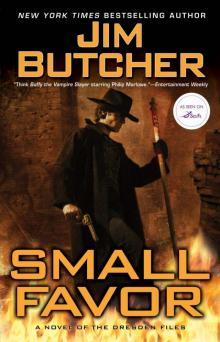 Small Favor
Small Favor Furies of Calderon
Furies of Calderon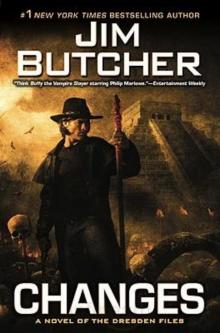 Changes
Changes White Night
White Night Death Masks
Death Masks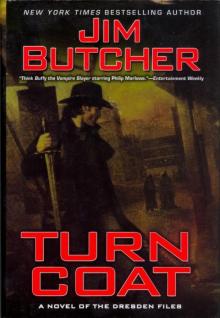 Turn Coat
Turn Coat Storm Front
Storm Front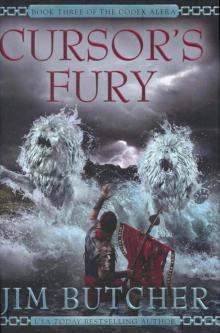 Cursor's Fury
Cursor's Fury Fool Moon
Fool Moon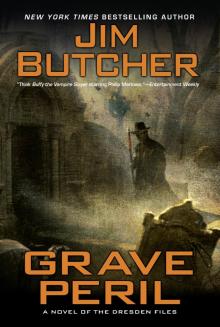 Grave Peril
Grave Peril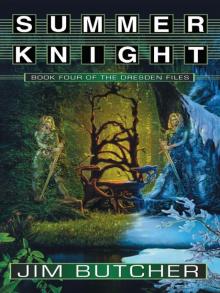 Summer Knight
Summer Knight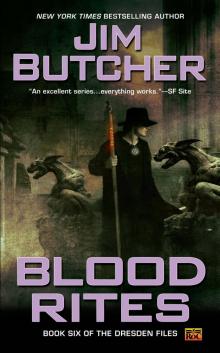 Blood Rites
Blood Rites Ghost Story
Ghost Story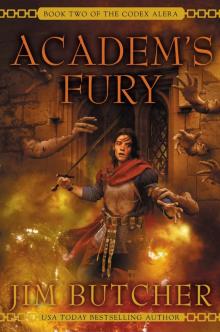 Academs Fury
Academs Fury Princeps' Fury
Princeps' Fury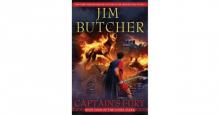 Captains Fury
Captains Fury Jim Butcher - Dresden Files Omnibus
Jim Butcher - Dresden Files Omnibus Christmas Eve
Christmas Eve Battle Ground
Battle Ground Blood Lite
Blood Lite Peace Talks
Peace Talks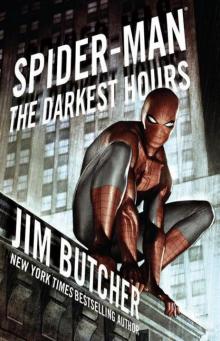 Spider-Man - The Darkest Hours
Spider-Man - The Darkest Hours Skin Game
Skin Game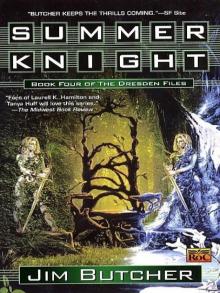 The Dresden Files 4: Summer Knight
The Dresden Files 4: Summer Knight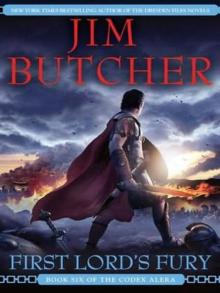 First Lord's Fury ca-6
First Lord's Fury ca-6 Storm Front df-1
Storm Front df-1 Princeps Fury ca-5
Princeps Fury ca-5 Cold Days df-14
Cold Days df-14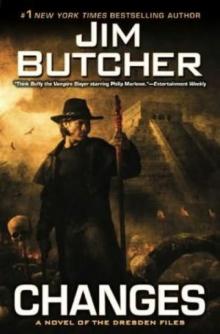 Changes df-12
Changes df-12 Urban Enemies
Urban Enemies Princeps' Fury (Codex Alera)
Princeps' Fury (Codex Alera)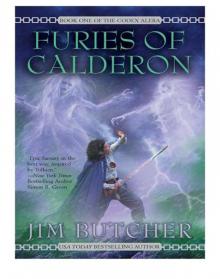 Codex Alera 01 - Furies of Calderon
Codex Alera 01 - Furies of Calderon Dresden Files 02 - Fool Moon
Dresden Files 02 - Fool Moon Cold Days: A Novel of the Dresden Files
Cold Days: A Novel of the Dresden Files Working for Bigfoot
Working for Bigfoot Side Jobs
Side Jobs Even Hand
Even Hand Brief Cases: The Dresden Files
Brief Cases: The Dresden Files Blood Rites: Book Six of the Dresden Files
Blood Rites: Book Six of the Dresden Files Fool Moon df-2
Fool Moon df-2 The Dresden Files Collection 7-12
The Dresden Files Collection 7-12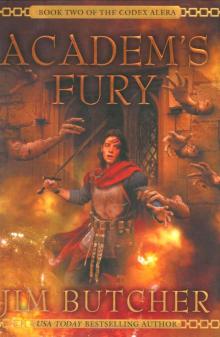 Academ's Fury ca-2
Academ's Fury ca-2 The Dresden Files 3: Grave Peril
The Dresden Files 3: Grave Peril Grave Peril df-3
Grave Peril df-3 Codex Alera 06 - First Lord's Fury
Codex Alera 06 - First Lord's Fury Brief Cases
Brief Cases Dresden Files Book 02: Fool Moon
Dresden Files Book 02: Fool Moon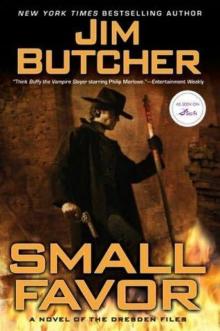 SMALL FAVOR tdf-10
SMALL FAVOR tdf-10 Bigfoot on Campus
Bigfoot on Campus Mean Streets
Mean Streets Dead Beat df-7
Dead Beat df-7 White Night df-9
White Night df-9 Shadowed Souls
Shadowed Souls Dresden Files 14 - Cold Days
Dresden Files 14 - Cold Days The Dresden Files Collection 1-6
The Dresden Files Collection 1-6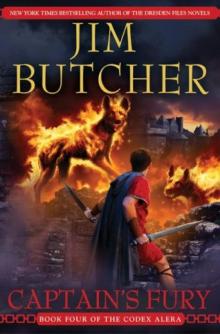 Captain's Fury ca-4
Captain's Fury ca-4 Odd jobs sftdf-2
Odd jobs sftdf-2 The Dresden Files 1: Storm Front
The Dresden Files 1: Storm Front Blood Rites df-6
Blood Rites df-6 Side Jobs: Stories from the Dresden Files
Side Jobs: Stories from the Dresden Files B is for Bigfoot
B is for Bigfoot Proven Guilty df-8
Proven Guilty df-8 Dresden Files SSC01 - Side Jobs
Dresden Files SSC01 - Side Jobs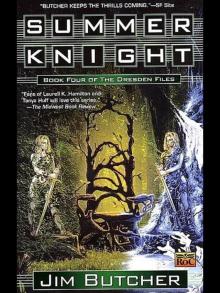 Summer Knight: Book Four of the Dresden Files
Summer Knight: Book Four of the Dresden Files Skin Game: A Novel of the Dresden Files
Skin Game: A Novel of the Dresden Files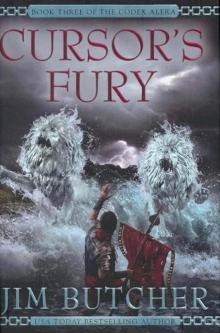 Cursors's Fury ca-3
Cursors's Fury ca-3 Dresden Files SSC02 - Odd Jobs
Dresden Files SSC02 - Odd Jobs Death Masks df-5
Death Masks df-5 Restoration of Faith (the dresden files)
Restoration of Faith (the dresden files) Furies of Calderon ca-1
Furies of Calderon ca-1 The Dresden Files 2: Fool Moon
The Dresden Files 2: Fool Moon Dresden files:Side jobs (dresden files:short stories)
Dresden files:Side jobs (dresden files:short stories) I Was a Teenage Bigfoot
I Was a Teenage Bigfoot Ghost Story df-13
Ghost Story df-13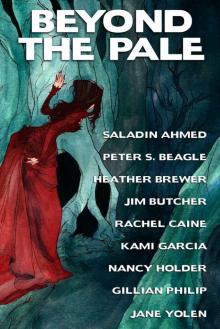 Beyond the Pale: A fantasy anthology
Beyond the Pale: A fantasy anthology Dresden Files 03 - Grave Peril
Dresden Files 03 - Grave Peril Side Jobs df-13
Side Jobs df-13